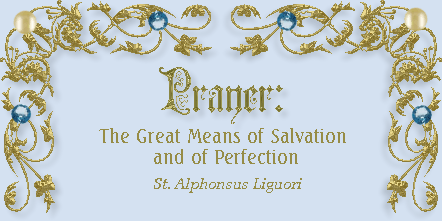  Chapter
1: God Wishes All Men
to be Saved; Jesus Christ Died to Save All Men That Jesus Christ,
therefore,
died
for all and each of mankind, is clear, not only from the Scriptures,
but
from the writings of the Fathers, Great certainly was the ruin which
the
sin of Adam occasioned to the whole human race; but Jesus Christ, by
the
grace of Redemption, repaired all the evils which Adam introduced.
Hence
the Council of Trent has declared that Baptism renders the soul pure
and
immaculate; and that the sin which remains in it is not for its harm,
but
to enable it to gain a higher crown, if it resists so as not to consent
to it: "For in the regenerate God hates nothing . . . they are made
innocent,
immaculate, pure, and beloved of God. . . . But this holy synod
confesses
and feels that concupiscence or the fuel [of sin] remains in Baptized
persons;
but as it was left for our probation, it cannot injure those who do not
consent to it; nay rather, he who contends lawfully [against it] shall
be crowned." Thus as St. Leo says, "we have gained greater things by
the grace of Christ than we had lost through the envy of the devil." The gain which we have made by the redemption of Jesus Christ is greater than the loss which we suffered by the sin of Adam. The Apostle plainly declared this when he said, "Not as the offense, so also the gift. For where the offense abounded, there did grace more abound." [Rom. 5 15, 20] Our Lord says the same: "I am come that they may have life, and have it more abundantly." [John 10: 10] David and Isaias had predicted it: "With Him is plentiful redemption.-----She hath received of the hand of the Lord double for all her sins." [Ps. 129: 7; Is. 40: 2] About which words the interpreter says: "God has so forgiven iniquities through Christ, that men have received double-----that is, very much greater good, instead of the punishment of sin which they deserved." Now that our Saviour, as I said, died for all, and that He offered the work of His redemption to the Eternal Father for the salvation of each one, the holy Scriptures assure us of the following: 1. THE TESTIMONY OF HOLY SCRIPTURE "The Son of Man came to save that which was lost." [Matt. 18: 11] "Who gave Himself a redemption for all." [1 Tim. 2: 6] "Christ died for all, that they also who live may not now live to themselves, but to Him Who died for them." [2 Cor. 5: 15] "For hereunto we labor and are reviled, because we hope in the living God, Who is the Saviour of all men, especially of the faithful." [1 Tim. 4: 10] "And He is the propitiation for our sins; and not for ours only, but also for those of the whole world." [John 2: 2] "For the charity of Christ presseth us, judging this that, if one died for all, then all were dead." [2 Cor. 5: 14] And to speak only of this last text, I ask, how could the Apostle ever have concluded that all were dead, because Christ died for all, unless he had been certain that Christ had really died for all? And the more, because St. Paul uses this truth as an argument for the love which it should kindle in us towards our Saviour. But by far the best passage to exhibit the desire and wish which God has to save all men, is another text of St. Paul: "He that spared not His Own Son, but delivered Him for us all." [Rom 8: 32] The force of this passage is increased by what follows: "How hath He not also with Him given us all things." [Ibid.] If God has given us all things, how can we henceforth fear that He has denied us the election to glory, always on condition that we correspond [to His grace]? And if he has given us His Son, says Cardinal Sfondratl, how will He deny us the grace to be saved? "Here he clearly instructs us" [he is speaking of St. Paul] "that God assures us that He will not refuse us the less after He has given the greater; that He will not deny us grace to save ourselves, after giving His Son that we we might be saved." And in truth, how could St. Paul have said that God, in giving us His Son, has given us all things, if the Apostle had believed that God had excluded many from the glory which is the one good and the one end for which they were created? Has then God given "all things" to these "many," and yet denied them the best thing-----namely, eternal happiness, without which [as there is no middle way] they cannot but be eternally miserable? Unless we would say another thing still more unseemly, as another learned author well observes------namely, that God gives to all the grace to attain glory, but then refuses to allow many to enter on its enjoyment; that He gives the means, and refuses the end. 2. THE TEACHING OF THE HOLY
FATHERS For the
rest, all
the
holy Fathers agree in saying that Jesus Christ died to obtain eternal
salvation
for all men. St. Jerome:
"Christ
died for
all; He was the only one Who could be offered for all, because all were
dead in sins." St. Ambrose: "Christ
came to
cure
our wounds; but since all do not search for the remedy . . . therefore
He
cures those who are willing; He does not force the unwilling." In
another
place: "He has provided for all men the means of cure, that whoever
perishes
may lay the blame of his death on himself, because he would not be
cured
when he had a remedy; and that, on the other hand, the mercy of Christ
to all may be openly proclaimed, Who wills that all men should be
saved."
And more clearly still in another place: "Jesus did not write His will
for the benefit of one, or of few, but of all; we are all inscribed
therein
as His heirs; the legacy is in common, and belongs by right to all; the
universal heritage, belonging wholly to each." Mark the words, "We
are all inscribed as heirs of Heaven." St. Leo: "As Christ found no one free from guilt, so He came to deliver all." St. Augustine, on the words of St. John, "For God did not send His Son to judge the world, but that the world might be saved through Him," says: "So, as far as it lies with the physician, He came to heal the sick man." Mark the words, "as far as it lies with the physician." For God, as far as He is concerned, effectually wills the salvation of all, but [as St. Augustine goes on to say] cannot heal the man who will not be healed: "He heals universally, but He heals not the unwilling. For what can be happier for thee, than, as thou hast thy life in thy hands, so to have thy health depend on thy will?" When he says "He heals," he speaks of sinners who are sick, and unable to get well by their own strength; when he says "universally" [omnino], he declares that nothing is wanting on God s part for sinners to be healed and saved. Then when he says, "as thou hast thy life in thy hands, so thy health depends on thy will," he shows that God for His part really wills us all to be saved; otherwise, it would not be in our power to obtain health and eternal life. In another place, "He who redeemed us at such a cost, wills not that we perish; for He does not purchase in order to destroy, but He redeems in order to give life." He has redeemed us all, in order to save us all. And hence he encourages all to hope for eternal bliss in that celebrated sentence: "Let human frailty raise itself; let it not say, I shall never be happy. . . . It is a greater thing that Christ has done, than that which He has promised. What has He done? He has died for thee. What has He promised? That thou shalt live with Him." Some have pretended to say that
Jesus Christ
offered His Blood for all, in order to obtain grace for them, but not
salvation.
But Petrocorensis will not hear of this opinion, of which he says: "O
disputatious
frivolity! How could the wisdom of God will the means of salvation,
without
willing its end." St. Augustine, moreover, speaking against the Jews,
says: "Ye acknowledge the side which ye pierced, that it was opened
both
by you and for you." If Jesus Christ had not really given His Blood
for all, the Jews might have answered St. Augustine, that it was quite
true they had opened the side of our Saviour, but not that it was
opened
for them. In like
manner,
St.
Thomas
has no doubt that Jesus Christ died for all; whence he deduces that He
wills all to be saved: "Christ Jesus is mediator between God and men;
not
between God and some men, but between Him and all men; and this would
not
be, unless He willed all to be saved." This is confirmed, as we have
already said, by the condemnation of the fifth proposition of
Jansenius,
who said, "It is semi-Pelagianism to assert that Christ died or shed
His Blood for all men." The sense of this, according to the context of
the other condemned propositions, and according to the principles of
Jansenius,
is as follows: Jesus Christ did not die to merit for all men the graces
sufficient for salvation, but only for the predestined; or, in
Jansenius's
own expressed words. "It is in no way consonant to the principles of
Augustine,
to think that Christ our Lord died or shed His Blood for the eternal
salvation
either of unbelievers, who die in their unbelief, or of the just,
who do not persevere." Therefore the contrary and Catholic belief is
as follows: It is not semi-Pelagianism, but it is right to say that
Jesus
Christ died to merit not only for the predestinate, but for all, even
for
the reprobate, grace sufficient to obtain eternal salvation in the
ordinary
course of Providence. Further,
that God
truly,
on His part, wills all men to be saved, and that Jesus Christ died for
the salvation of all, is certified to us by the fact that God imposes
on
us all the precept of hope. The reason is clear. St. Paul calls
Christian
hope the anchor of the soul, secure and firm: "Who have fled for refuge
to hold fast the hope set before us which we have as an anchor of the
soul,
sure and firm." [Heb 6: 18] Now in what could we fix this sure and firm
anchor
of our hope, except in the truth that God wills all to be saved? "With
what confidence," says Petrocorensis, "will men be able to hope for
God's
mercy, if it is not certain that God wills the salvation of all of
them?
With what confidence will they offer the death of Christ to God, in
order
to obtain pardon, if it is uncertain whether He was offered up for
them?"
And Cardinal Sfondratl says, that if God had elected some to eternal
life,
and excluded others, we should have a greater motive to despair than to
hope; seeing that, in fact, the elect are much fewer than the damned:
"No
one could have a firm hope, since he would have more grounds of despair
than of hope; for the reprobate are much more numerous than the elect."
And if Jesus Christ had not died for the salvation of all, how could we
have a sure ground to hope for salvation through the merits of Jesus
Christ,
without a special revelation? But St. Augustine had no doubt when he
said,
"All my hope, and the certainty of my faith, is in the Precious Blood
of
Christ, Which was shed for us and for our salvation." Thus the Saint
placed all his hope in the Blood of Jesus Christ; because the faith
assured
him that Christ died for all. . . .  HOME------------------------CATHOLIC CLASSICS www.catholictradition.org/Classics/prayer-4e.htm |